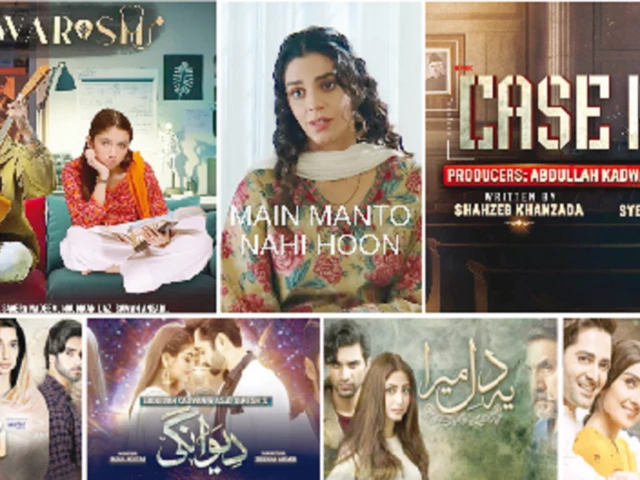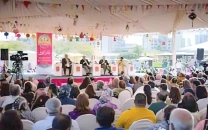Beyond the melodrama on screen
Experts debate if Pakistani TV dramas reflect reality

Experts from a cross-section of society believe that Pakistan's television drama, while portraying themes of love, conflict and family life, often reinforces problematic notions of male dominance and female vulnerability.
Speaking at an online discussion organised by the Uks Research Centre (URC), they said that frequent depictions of physical violence, toxic masculinity and weak female characters reflect deep-rooted social attitudes rather than challenge them.
The panel, comprising media specialists, women's rights advocates and communication experts, agreed that while some productions sensitively address mental health and relationships, many still normalise regressive behaviour.
The online discussion exploring how Pakistani television dramas portray love, violence and male behaviour in society at an even titled 'Depictions of Love, Violence and Male Behaviour in Society through Pakistani Dramas'.
Most part of the discussion was devoted to three dramas: 'Parwarish', Main Manto Nahin Hoon' and 'Case Number 9' Opening the discussion, Tasneem Ahmar, the URC executive director, referred to several dramas that, she said, reflected both positive and problematic tendencies. Some, she noted, stood out for their unique storytelling and sensitivity in depicting complex issues.
Others, however, she argued, highlighted disturbing trends that reinforce negative cultural stereotypes. Ahmar remarked that many dialogues in popular dramas mirror societal attitudes where women continue to be seen as weak or dependent.
Ahmar cautioned that, while attempts to portray reality were important, they could sometimes end up strengthening the very behaviours society seeks to challenge. "When we try to show the truth," she observed, "negative attitudes often become stronger".
Whenever awareness-driven content is shown, she stressed, "it must include a corrective or reformative message". She emphasised that the purpose of drama should be reform rather than replication, as audiences tend to absorb what they see on screen. "Media bears a responsibility," she said, "to ensure the messages it conveys are positive and socially constructive."
Women's rights activist Khawar Mumtaz drew attention to the physical violence often depicted in Pakistani serials. Scenes showing slapping, shoving or pulling hair, she said, leave a psychological imprint on audiences and risk normalising such behaviour.
"Male characters are frequently portrayed as powerful and even toxic," she pointed out, "while balanced relationships remain scarce. This persistent imbalance promotes gender inequality."
Sheherzad Samiuddin, a senior communication consultant, commended certain dramas for their realistic treatment of themes such as parenting and mental health. She called for trigger warnings to be placed before sensitive scenes so viewers could prepare themselves emotionally. "Such alerts," she said, "allow audiences to engage with the content more responsibly."
Samiuddin further noted the significance of viewer engagement on social media, saying that online comments serve as a valuable reflection of public opinion. Producers, she advised, should keep a close eye on these discussions to better understand audience reactions and preferences.
Journalist Injie Anis highlighted the importance of showing everyday disagreements between characters, calling such depictions both positive and relatable. "When dramas mirror real-life experiences," she said, "viewers connect more deeply and find the storytelling refreshing. We need more productions that embrace this kind of authenticity."
Freelance consultant Rafiah Arshad proposed that each drama episode should be followed by an open dialogue, allowing constructive discussion of both positive and negative elements. She stressed the need for clarity on what is considered acceptable and what is not in televised content. "A shared platform for media accountability," she suggested, "has become essential. Constructive criticism can play a crucial role in improving future storylines."
Participants in the session collectively underscored that audience reactions expressed on social media represent a vital form of public feedback. They recommended that such comments be documented and preserved as part of an ongoing effort to evaluate viewer sentiment and guide future creative decisions.
The discussion closed on a consensus that while Pakistani dramas continue to captivate audiences, they also carry the weight of social influence. The participants agreed that responsibility lies with creators to ensure that stories not only entertain but also encourage empathy, equality and reflection within society.




















COMMENTS
Comments are moderated and generally will be posted if they are on-topic and not abusive.
For more information, please see our Comments FAQ